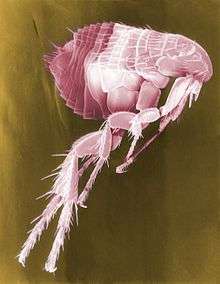Definify.com
Webster 1913 Edition
Flea
Flea
(flē)
, Verb.
T.
[See
Flay
.] To flay.
[Obs.]
He will be
And horse collars made of’s skin.
fleaed
firstAnd horse collars made of’s skin.
J. Fletcher.
Flea
,Noun.
[OE.
fle
, flee
, AS. fleá
, fleáh
; akin to D. vtoo
, OHG. flōh
, G. floh
, Icel. flō
, Russ. blocha
; prob. from the root of E. flee
. √84. See Flee
.] (Zool.)
An insect belonging to the genus
Pulex
, of the order Aphaniptera
. Fleas are destitute of wings, but have the power of leaping energetically. The bite is poisonous to most persons. The human flea (Pulex irritans
), abundant in Europe, is rare in America, where the dog flea (Ctenocephalides canis
, formerly Pulex canis
) and the smaller cat flea (Ctenocephalides felis
) take its place. See Aphaniptera
, and Dog flea
. See Illustration in Appendix. A flea in the ear
, an unwelcome hint or unexpected reply, annoying like a flea; an irritating repulse; as, to put a flea in one's ear; to go away with a flea in one's ear.
– Beach flea
, Black flea
etc. See under
Beach
, etc.Webster 1828 Edition
Flea
FLEA
,Noun.
An insect of the genus Pulex. It has two eyes and six feet; the feelers are like threads; the rostrum is inflected, setaceous, and armed with a string. The flea is remarkable for its agility, leaping to a surprising distance, and its bite is very troublesome.
Definition 2026
flea
flea
See also: fleá
English
Pronunciation
- IPA(key): /fliː/
- Rhymes: -iː
- Homophones: flee
Noun
flea (plural fleas)
- A small, wingless, parasitic insect of the order Siphonaptera, renowned for its bloodsucking habits and jumping abilities.
- A thing of no significance.
- 1871, Fitz Hugh Ludlow, The Heart of the Continent (page 414)
- The nation of beggars on horseback which first colonized California has left behind it many traditions unworthy of conservation, and multitudinous fleas not at all traditional, but even less keepworthy […]
- 1871, Fitz Hugh Ludlow, The Heart of the Continent (page 414)
Derived terms
Terms derived from flea
|
|
Translations
parasitic insect
|
|
Etymology 2
Alternative forms.
Verb
flea (third-person singular simple present fleas, present participle fleaing, simple past and past participle flead)
- Obsolete spelling of flay
- 1749, Henry Fielding, Tom Jones, Folio Society 1973, p. 74:
- In this Thwackum had the advantage; for while Square could only scarify the poor lad's reputation, he could flea his skin [...].
- 1749, Henry Fielding, Tom Jones, Folio Society 1973, p. 74:
